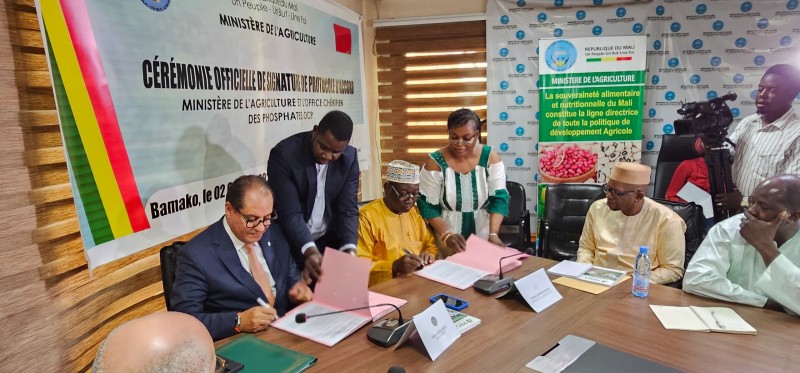Read in
A digital mapping initiative will enable precise fertilization, adhering to the 4R principles: the right time, the right source, the right ratio, and the right place.
Rabat – In a move aimed at transforming the agricultural landscape of Mali, OCP Africa, the African subsidiary of Morocco’s OCP Group, has signed a memorandum of understanding with Mali’s Ministry of Agriculture.
This collaboration, supported by the World Bank, seeks to enhance agricultural productivity by focusing on sustainable practices and improved soil health, ultimately benefiting the country’s smallholder farmers.
The agreement reflects a commitment to strengthen agricultural resilience in Mali, a country where agriculture plays a crucial role in the economy, contributing approximately 33% of its GDP.
Despite this significance, Mali faces challenges such as arid conditions affecting over half of its 1.24 million square kilometers, with only 4% of the land under cultivation.
As urbanization increases—particularly in Bamako, which now houses 20% of the population—there is a pressing need to bolster agricultural productivity and ensure food security.
To tackle these issues, OCP Africa’s new partnership will implement innovative strategies, including the establishment of experimental plots designed to test advanced methods for restoring soil fertility.
A digital mapping initiative will enable precise fertilization, adhering to the 4R principles: the right time, the right source, the right ratio, and the right place. This technology-driven approach aims to optimize the use of fertilizers and improve crop yields.
In addition to the experimental plots, the initiative will launch new-generation agricultural service centers across the country. These centers will serve as hubs for disseminating best practices, offering farmers crucial resources and information.
A digital platform will also be developed to connect farmers with agricultural value chains, fostering greater access to markets and services.
Furthermore, a mobile school-laboratory will provide soil analysis and agronomic advice directly to farmers in the field, ensuring they receive timely and relevant support.
Recognizing the importance of youth and women in agriculture, the partnership will also focus on promoting agricultural entrepreneurship through agritech.
Collaborating with Mohammed VI Polytechnic University, OCP Africa will offer training and support for agritech startups, fostering a new generation of innovators in the agricultural sector.
This effort aims to create a robust ecosystem of agricultural businesses backed by venture capital, enhancing local innovation and job creation.
Dr. Mohamed Anouar Jamali, Managing Director of OCP Africa, emphasized the significance of this partnership, stating, “This initiative marks a pivotal moment in our efforts to revitalize the agricultural sector in Mali. By leveraging innovative technologies such as soil mapping and precision fertilization, we can significantly contribute to sustainable agricultural development in the country.”
OCP Africa has a proven track record of commitment to Mali’s agricultural sector, having supplied 15,000 tons of fertilizer during the 2023/2024 season and planning to increase this to 21,000 tons for the next season.
The establishment of 44 experimental plots for key crops like rice and maize demonstrates OCP Africa’s proactive approach to enhancing agricultural practices in the region.
This partnership aligns with King Mohammed VI’s vision for South-South cooperation, promoting collaboration among African nations to address common challenges. It also highlights the World Bank’s strong commitment to supporting agricultural development across the continent.



